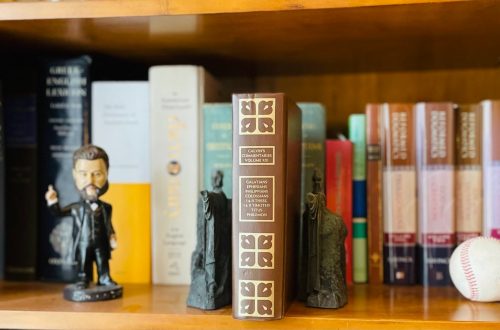 If you missed CNN’s “After Jesus” special last night, you didn’t miss much. It was more fanciful musings on the history of earliest Christianity of the sort that we saw last Spring with the release of The Gospel of Judas, the media blitz of Bart Ehrman’s Misquoting Jesus, and the release of the movie The DaVinci Code.
If you missed CNN’s “After Jesus” special last night, you didn’t miss much. It was more fanciful musings on the history of earliest Christianity of the sort that we saw last Spring with the release of The Gospel of Judas, the media blitz of Bart Ehrman’s Misquoting Jesus, and the release of the movie The DaVinci Code.
“After Jesus” makes at least three provocative claims:
1. Earliest Christianity was pluriform in its beliefs. Scholars like Bart Ehrman allege that Christianity as we know it is a result an “orthodox” movment to suppress other valid expressions of Christianity during the first and second centuries. Thus, according to Ehrman, Gnosticism (an early heresy) is a “lost Christianity” that was sidelined by a Christian Canon that excludes Gnostic writings.
2. Earliest Christianity was egalitarian. The current Christian Canon of scripture is often patriarchal, and such repressive patriarchy is actually a misrepresentation of earliest Christianity. Moreover, other early writings (especially Gnostic ones) show us that Jesus and some of his earliest followers were more-inclusive of women in church leadership.
3. Earliest Christianity was political. Jesus’ message was mainly a political message that threatened the overthrow of the Roman Empire. Thus Christians were persecuted because they were “troublemakers” for the Roman Empire.
There’s nothing new about these claims, and I wrote a great deal about them earlier this year. You can read some of my previous posts here.
But one of the most telling moments of the whole documentary comes at the end. It is here that the naturalistic perspective of the historical scholars is revealed:
In the span of three centuries, the life and death of a Jewish rabbi from Nazareth had become the basis of the favored religion of the Roman Empire and gospel to millions, an astounding development that still fascinates and confounds even the experts. . .
It’s interesting that one single Jew becomes the focus of the devotions of a whole people, while — you know, there were many other Jews who were — who had also been crucified and many of them were also known as Messiahs, in the same time period. None of them have the following. So the big question is, why Jesus? Why did he get that type of following? . . .
Little wonder that the most popular explanation over the ages was that this all had to be the work of God. But historians don’t work from divine theories.
And it is in that last sentence that the bias of the presentation is revealed. Historians and popular documentaries of this sort usually discount the possibility of the supernatural. Thus their historical analyses frequently preclude the biblical accounts which are decidedly supernatural.
So “After Jesus” has an ax to grind, whether its creators realize it or not. They interviewed historians who by and large begin with a presupposition that precludes the supernatural accounts of the Bible. This is hardly a fair and balanced approach. Thus “After Jesus” takes its place among the ranks of Christianity’s detractors. And Christianity marches on nevertheless.




9 Comments
Nicholas Cardot
We should know better than to expect much accuracy concerning the early church from those who are lost. Their eyes are covered with scales when it comes to understanding the miracles surrounding the founding and growing of Christianity! God bless you.
Debbie
I didn’t get to see that one but i watched ‘What is a Christian?’ Richard Land and Derrell Bock did some of the commentary.
Sean LeRoy
Denny:
Thanks so much for the summary…very helpful.
I too, like Debbie, did not see this segment but did watch the one from a night before.
What I think we ought to do as Christians is put our minds and money together and put something out to the general public; something well done and truthful; something that lifts Jesus up and doesn’t ‘deconstruct’ him.
Kris Weinschenker
I thought the show was actually one of the better secular shows on the Early Church I’ve seen. Although, I do agree Ehrman’s comments were generally way off the mark, the Early Church most CERTAINLY was egalitarian (read Acts). Constantine and the Nicean Council turned into an “orthodoxy”.
The Gnostics didn’t have all the answers, but neither did the Romans.
dennyrburk
Kris,
Since the Gnostics were heretics who denied the incarnation and bodily resurrection, I don’t think we should be looking to them for any answers.
Thanks for reading and for the comments.
Sincerely,
Denny Burk
Kris Weinschenker
The Gnostics were branded “heretics” by the orthodoxy. Many of the ideas were in fact heretical, but in essence, the orthodoxy threw the ‘baby out with the bathwater’.
There actions were much like what the Pharisses has done in Jesus’ time. The driving force behind the Nicean Council was Rome, and it was Rome that wanted ‘standards and practices’ imposed on the Church. The fact that the Church then became a politcal entity only goes to show that the Church truned Jesus message into a ‘political’ one.
Kris Weinschenker
The Fox News special “Who was Jesus?” was also very good for a secular program.
Jenn
I was wondering what this would contain and was afraid I’d missed something since I don’t have cable. Thanks for the play by play.
Christ alone,
Jenn
Michael
Interesting to hear your perspective. I actually saw the program as quite different (although I too was disappointed). In my opinion, the program was rather poorly researched. It took elements of truth but jumped to conclusions and only scratched the surface. I am an amateur historian and I’ve spent a lot of time researching biblical history, and the segments on the Gnostic Gospels in particular were absurd. For one, the claim that all the Gnostic Gospels were written AFTER Matthew, Mark, Luke and John is false. The Gospel of Thomas, for example, may have been written as early as 60 AD and used as source material for the canon.
At one point, the program seemed to portray the Gnostic Gospels as anti-Semitic and anti-female, not to mention one set of texts that were all in agreement, which is simply false. ALL the gospels have their own interpretation and view.
Further, there was very little mention of the origin of December 25th as Christmas (i.e. a co-opting of a pagan holiday), and other similar practices. This is disheartened because I think that understanding the WHOLE story really makes the story of early Christianity much more interesting and compelling.
Then again, it’s obviously a very complex story with lots of emotions and elements that may not always agree, so I guess hoping all of that could be fit fairly into 2 hours is probably silly. 😉